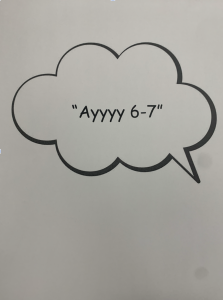Should Esports be Allowed in Middle School?

Gamers use controllers like this when playing a variety of games.
March 21, 2023
Each year, there are numerous esports competitions for games such as “Apex Legends,” “Overwatch,” and “Halo.” These tournaments and events allow gamers into a world of fantasy and fun, promoting teamwork and communication. Competitors can even earn college scholarships for their gaming skills. But children and teens can also fall prey to video game addiction among other gaming-related health problems. What would happen if esports were designated a middle school sport?
There is a difference between esports and video games. According to Innovation & Tech Today, “Gaming is the umbrella term for playing any video game on any platform or by any means. Esports is gaming but on a competitive level.”
Recently, esport competition has begun to enter middle and high schools. What would happen if they were integrated into Day Creek?
“We should have esports because I know there are a lot of people that enjoy it, so I would do esports but [only] once a week and [not for] very long,” said Moira M., a seventh-grade student.
Sometimes gaming has a bad reputation for leading to anxiety, depression, aggression, and laziness, but it can also benefit teenage gamers.
According to Independent, “The effect of video games on children’s social skills is often a cause for concern, but the team found links between high game usage and better peer relationships and good social skills.”
Gaming may also encourage students to avoid unnecessary absences as they interact with friends when paired with games they enjoy playing.
“I think [having esports] could become a way for students to look [forward] to school. As long as it’s controllable, it’s a great hobby,” said Zachary C.
Mixing esports into the school curriculum could help students bond which would provide a bright spot into an otherwise dreary day.
“An esports period would make each day better because of how fun it is to most students. It’s very amusing and addicting, so why wouldn’t kids love to enjoy it at school? Knowing how boring [school] is, it would obviously bring joy to most kids who love playing video games.” said Mia L, another seventh grader on campus.
Aside from improving social skills, and giving students more ways to enjoy school, players are also given another way to stay connected with peers who they don’t see in person that often.
“There are lots of different types of games that you are able to play and everyone has their own personal favorites. They also give you time to have fun with friends and family and show your skills,” said Mia L.
Gaming, like other activities, can be good in moderation, and may actually have some benefits, which is why many people believe esports should be a sport in schools, as it may even give some spotlight to students with talents in STEM.
According to IFS.com, “Gamers gain useful skills from participating in esports that help them on a broader learning journey. Analytical problem solving, time management, collaboration, and teamwork are key. Video games can also help to improve visual perception, enhance memory, and lead to better focus and attention… Students may find careers in the technology end of video games or create a path to other STEM related careers such as computer science, research, or medicine. The future will rely on technology and even healthcare is now using virtual gaming experiences to help rehabilitate certain conditions”
While some may argue that video games lack educational value, having them in school could be helpful in tandem with real-life sports.
“[In] basketball [for example], you could look at the strategies and how to [play the game]. It would probably be good as a supplement to the actual sport,” said Ruiee S.
Still, excessive time spent playing video games could lead to gaming addiction and various health issues, including sleep and diet disruption from gaming through the night and during mealtimes, obesity, cardiac problems, eyesight degradation, lack of focus, and even depression.
“I used to be addicted to video games at the point where it was all I thought about, and I just wanted to finish whatever I was doing so I could play. Now, I save time to play video games and only play for a couple hours before I’m able to stop. It’s not really that important to me anymore,” said Mia.
The same mindset isn’t true for everyone, and endless competitive screen time may bring unwanted side effects.
“People have different personalities that match up with the different games they play and are into. [People who play video games need to be] careful about what they prioritize in life and that other things are more important than video games,” said Mia.
Emotions can run high during gaming, and if left unchecked, the nature of esports can bring out the worst in teenage personalities.
“Most of the time, I get mad when I lose a match and get a quick rage attack. I sometimes hit things like my table or yell or just quit. But this happens to most people when playing competitive games. It’s frustrating because you know you can do better and you just want to feel like you’re accomplishing something even though it’s just a silly video game,” said Mia.
Not only are there emotional pitfalls, but a player’s physical health may also be impacted as well.
“It’s not good to spend too much time on screens because when we’re in puberty, it can be detrimental to our eye health. And also I think it’ll be better if the school holds more active sports because we’re growing, and it’s best not to [just] sit in a chair,” said Ruiee S.
No matter the personality, teen gamers must be careful that gaming isn’t all-consuming. And integrating esports into school could cross that boundary. Too much screen time on or off campus could cause kids to drift away from more important things. Gamers shouldn’t attach to something that robs them of life, even if it’s part of school curriculum.
“When you get into gaming, it can be too much fun, and you start wanting to only do that. It can start to take over your conversations with friends or end friendships. You [can] lose your world,” said Zach C.





